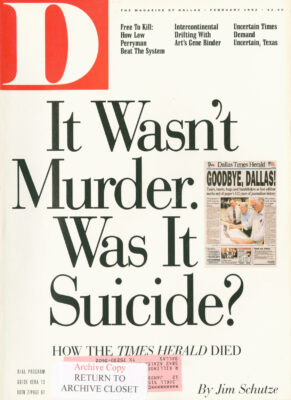Wayne McManners thought he had it all wired that night back in 1976. As the Texas promo man for MCA Records, it was his responsibility to help promote the Who’s new album, The Who by Numbers, and the single, “Squeeze Box.” The band was undertaking its first U. S. lour since its phenomenally successful LP, Who’s Next.
To kick off the Texas leg of the lour, the Who invaded Houston, where McManners had set up a huge party at the Houston Oaks Hotel. He invited radio programmers from around the country and flew in writers from Rolling Stone, Billboard and Record World. An open bar served everything from Dom Per-ignon to Courvoisier as women with accordions circulated, flirting and hyping the release of “Squeeze Box.”
Knowing the Who’s inflammatory reputation (the band first gained notoriety by smashing all its instruments at the end of each gig), McManners decided to take a few precautions. First he posted a $3,000 cash bond with the hotel in case drummer Keith Moon kept up his habit of trashing his room, and he hired some off-duty Houston policemen as security guards. As the party reached its peak, everything seemed to be going fine, with various members of the Who taking the stage to thank all the radio peo-ple for coming-and, of course, for playing the new single.
Then, disaster. Moon, violently drunk, launched into a besotted monologue, stopping his rant to say that he thought it would be nice if some of the gorgeous women in the crowd would take their tops off. Several complied immediately, and Moon began autographing their breasts with a felt-lip pen. More of the crowd decided to get with the program, and soon a lot of people were taking off all their clothes. Photographers swarmed, gleefully snapping pictures of Moon.
The Houston cops moved in to arrest Moon, but bassist John Entwistle jumped in between them and told the officers where they could “stick their bloody badges.” By morning the whole debacle was coast-to-coast news. McManners had to go down to the courthouse to bail out Moon and Entwistle in time for that evening’s concert.
“I was certain I was going to get fired,” recalls McManners, “but instead the company promoted me to West Coast promotions manager.”
SUCH ANTICS ARE STILL PART OF THE PROMO GAME. RECORD LABELS live and die by airplay, but only a few of the thousands of records that inundate stations each month will ever get airplay. That eternal struggle for airplay is why so many of the major record labels (Warners, Elektra, Geffen. Capitol, Atlantic, RCA) have offices and promo people in Dallas. Their mission: to get the records played on the radio, by whatever means it lakes.
“Promo men are split into two camps,” muses Redbeard, music director at KTXQ (Q102). “Some are very useful and aware of the goals of our station, so they don’t waste my time with a record that won’t fit. Then there is another group who are from the old school.
They think that if they buy you lunch, say ’Ciao, baby’ when they leave and tell a dirty joke, you’ll play their records.”
Listening to your favorite radio station, it might sound as if the DJ is grooving in the booth, picking tunes to fit the whims of the moment. Nothing could be further from the truth. Before that DJ walks into the booth, he or she has been given strict guidelines about which new records to play and how often to play them. DJs have some latitude in their oldies choices, but even those must be drawn from a pre-approved “playlist” made up by the station’s program director. Getting on that playlist means life itself to record labels-and that has spawned a major industry catering to the desires and whims of the people making the choices.
In the early days of rock ’n’ roll, the promo game often was blatantly corrupt. But after the “payola” scandal ruined the career of Alan Freed, the Cleveland DJ who coined the term “rock ’n’ roll,” things changed. Direct cash payments to a radio station were out, but an enterprising promo man could take a station’s program director out to dinner, get him drunk and pay for an evening of female companionship.
During the ’70s, the promo man came into his own. Flush with cash from platinum record sales, the labels threw ever-bigger and better parties. There would be a listening party every week at a hotel, where radio and record-store employees would be invited to munch crab claws and shrimp, take in all the free drinks they could handle and listen to the newest release by the label’s newest star. There were limo rides to concerts, abundant supplies of drugs and lots of gifts and trips to exotic locales. And some came up with more ingenious tactics to get records on the air.
When British rockers Thin Lizzy released the single “Cowboy Song,1’ Dallas promo man Ronnie Raphael not only dressed up as a cowboy, but rode a horse to the stations to deliver the record in person. The song got played and it charted. Former Playboy model Barbi Benton went that stunt one better. When she had a country single out on Playboy Records, Benton flew into Dallas to make a tour of the area radio stations-clad in nothing but a bikini and a trench coat. After that kind of personal attention, many program directors added Benton’s record to their playlists.
Most Dallas promo people insist that this type of “lobbying” wouldn’t get results here today, although it still might work in some secondary markets, such as Austin, Tulsa or Waco. In the ’90s, stations have tighter play-lists and are monitored by industry professionals. And Dallas has earned a reputation as being one of the toughest markets in the country in which to break a new record. Despite large followings, both Jimmie and Stev-ie Ray Vaughan were unable to get their first albums played locally; they broke in through other markets and won Dallas air time only when they were already on the charts.
Wayne McManners, now regional promo man for MCA records, has been in the business for 15 years. “When I started in 1973, all of the decisions were made over a cocktail or a joint,” he says. “Now almost all of the decisions are made in a gym. Something had to change, or we would all be dead now. What has not changed is the competitiveness of the industry. In 1973 there were almost 400 records a week coming out. Now there are even more (500-600 per week).” Only about 1 percent of all the records released receive exposure during prime listening hours. McManners says.
According to Raphael, now an independent promo man for the Southwest Album Network, the biggest change has been the fragmentation of the pop-music market into a vast number of micro-markets. “’When I started in 1975, I could bring records by The Ohio Players, Earth Wind & Fire, or the Isley Brothers to (rock stations) KLIF, KNUS or KZEW and they would play them “says Raphael. “Today I couldn’t bring a record like that to Q102. In the past, we wanted to have the number one radio station in Dallas, period. Now they just want to be number one with white males 18 to 34 years of age or number one with females 24 to 49.”
Raphael, who is the cousin of Willie Nelson’s harmonica player, Mickey Raphael, adds that with the greater competitiveness has come a knee-jerk cautiousness among some radio programmers.
“It’s safer for the stations to play a mediocre record by a known, established artist than a great-sounding record by an unknown artist. There are fewer slots available on the playlist for the newer acts,” says Raphael. McManners believes that the toughest station to crack is KVIL, with its short playlist of approximately nine or 10 current releases (the rest are oldies). KEGL has about 30 slots and KDGE has about 40. On “station day” each week, the lobbies of local radio stations are invaded by dozens of promo people pushing stacks of new records. It’s a time for sweet-talking, wheedling, calling in markers and, in some cases, desperate pleading.
The tightening playlist is not the only change in the radio and record business. Of the 36 promo people working the Dallas-Fort Worth stations, seven are now women. That’s a 700 percent increase from 1978, when June Colbert was Dallas’ only promo woman.
“It was very difficult for me to build relationships back then because most of the program directors liked to have lunch in topless bars,” says Colbert, who is now with Arista Records in Dallas. “Every one of the program directors were male, and they were not comfortable with a woman coming into a station. I remember it was so difficult for me that 1 considered quitting during my first year.”
Colbert persevered, eventually breaking into the good ol’ boy circle. Fourteen years later, she’s handling promo for major acts such as Whitney Houston and Kenny G.
“Nowadays we’re all professionals,” she says. “But what hasn’t changed is that it is still difficult for me to work live shows with the artists because the backstage security crews still treat every woman there like a groupie. It doesn’t matter what kind of credentials or passes you have. They feel that you’re there because you want to go to bed with the band.”
The promo game has also seen technological mutations. During the past year, a new service called Broadcast Data Service (BDS) has come into the Dallas-Fort Worth radio market. Since every record leaves a distinct voice print, much like a human voice, the monitoring service makes it possible for record companies to know exactly when- and how often-their records are being played. With BDS, promo people know whether all the wining and dining is doing any good. If it’s not, the station can be “blackballed”-no free concert tickets and other goodies, no on-air appearances by top artists who hit town.
“Before BDS we pretty much had to take a station’s word for it that they were playing our songs.” says McManners. “But with BDS we can nail them if they are not coming through. I’ve had some stations insist that they were playing my record, but the BDS chart would show they were playing it between midnight and 3 a.m., when no one is listening.”
Of course there’s little difficulty in getting a new release by Don Henley or Hammer on the radio. The real test comes in getting air time for a new artist. Considering that it costs a record company nearly $250,000 to record an LP. produce a video and buy advertising. the promo man or woman who consistently fails to get the label’s records on the air will soon be looking for a new job. “My formula for success in this business is that 98 percent of it has got to be in the grooves, 1 percent is in getting to the right person and another 1 percent is in making the right presentation,” says Raphael. “I’m paid to get to the decision maker and make my pitch.”
One program director is a bit more blunt. “Any influence you have will be in who you know and who knows you. Otherwise you are just an errand boy.”
Despite the fierce competition, the gender shift and the new technology, one constant remains in the promo game: The stars’ massive egos, which require endless coddling.
“I was touring with Daryl Hall and John Oates.” recalls Danny Owen, a former promo man who is now program director for KZPS. ’And one morning the band’s road manager called me up to their hotel room, handed me a pair of shoes and asked if I could get them shined for Daryl before the show that night. That’s when I decided to quit. I didn’t get into this business to become a shoe-shine boy.”





